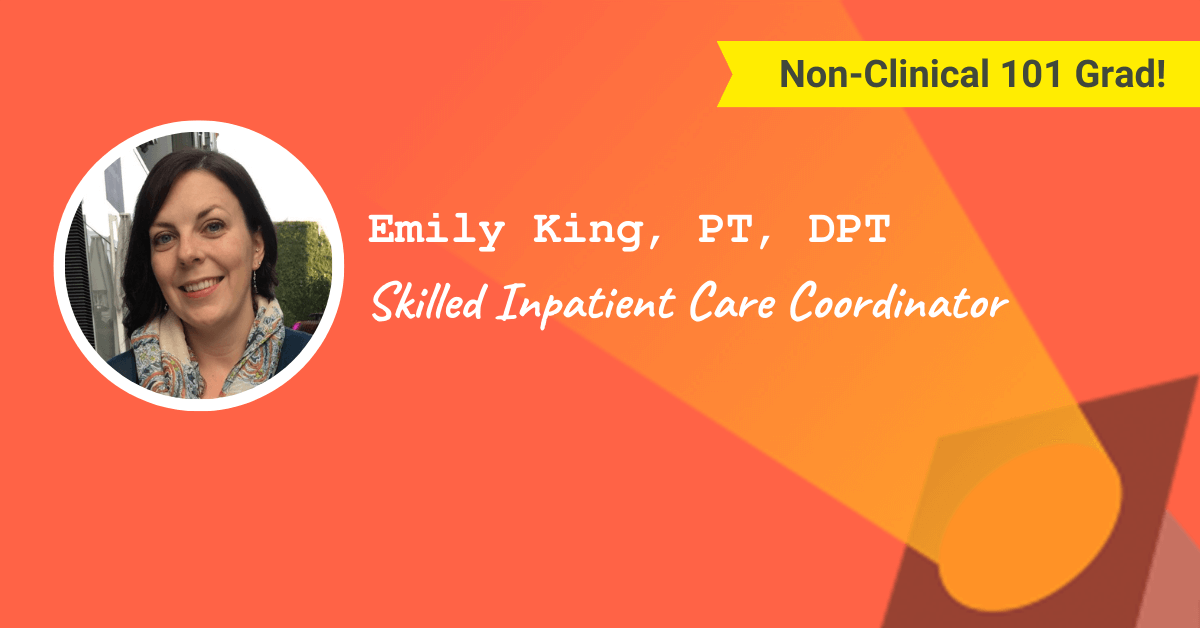Today’s non-clinical spotlight focuses on Emily King, a physical therapist and Non-Clinical 101 alumnus who works as a skilled inpatient care coordinator at naviHealth.
This post may contain affiliate links or codes. This won’t increase your cost, but it helps keep TNCPT alive, and free of annoying ads! Thank you for your support. 🙂
What is your full name and title at your current job?
Emily King, PT, DPT
Skilled Inpatient Care Coordinator (SICC) at naviHealth

Where are you located?
Buffalo, NY area
Where did you go to PT school, and what year did you graduate?
Daemen College in Amherst, NY. I graduated with my DPT in 2011.
What did you do when you first finished school, and for how long?treat?
I’ve worked my way around various settings after graduating. I started in SNF/LTC for a year and a half. I switched to acute for three years, and it was probably my favorite setting.
I was primarily based out of the orthopedic unit (post-op TKA, THA, spine surgeries, etc.) but I was also the on-call PT for the emergency room. If one of our ortho patients got transferred to the cardiac, neuro, or ICU floors, we would follow them.
It was really interesting to work on so many different units during my time there. I then spent about five years in a rural hospital as the assistant director of rehabilitation, then the director of rehab. We managed both acute patients and an outpatient clinic.
Because we were rural, we saw EVERYTHING…ortho, neuro, vestibular…10-year-olds to 100-year-olds…it was a wide range of patients and diagnoses.
What did you do after that, and for how long?
I went straight to my current role as a skilled inpatient care coordinator at naviHealth.
However, I strongly considered various other non-clinical roles in the interim (such as working in the bakery at my local grocery store).
What did you enjoy about your early roles? What didn’t you enjoy?
I worked in SNF before the switch to PDPM CMGs. It was ALL about the minutes, and I felt like my clinical judgement didn’t matter.
Although I learned a lot in the acute setting, therapy was often used to “get patients out of bed/back to bed,” and I felt like I wasn’t working to my full potential.
In the outpatient ortho setting, I was getting so burned out with all of the insurance regulations. Patients that I felt needed more therapy had to conserve visits because they only had 20 for the year, and others that I tried discharging had unlimited benefits and wouldn’t transition to a HEP.
At what point did you realize you wanted to do something non-clinical with your background, and why?
I honestly thought about switching majors in college, but I had so many friends and family encouraging me to finish my DPT, it was hard to quit.
I kept changing settings in hopes of finding something I really loved with the degree I had, but I never did.
What are you doing these days?
I am working as a skilled inpatient care coordinator (SICC) at naviHealth.
I also teach per diem at Bryant and Stratton College. The classes are all online, and are geared toward students interested in becoming medical administrative assistants, or billers and coders. I teach mostly Healthcare Terminology, Anatomy and Physiology, and Electronic Medical Records.
The curriculum is all pre-determined, I just engage with students and grade assignments.
Editor’s note: Emily has since landed a new job as a clinical strategy analyst. Check out Emily’s most recent spotlight for details on her non-clinical career growth!
Does the skilled inpatient care coordinator role have any direct patient care?
No, I am solely non-clinical at this point.
How long have you been in your current role?
I have been in this role since October, 2020.
How did you find your job? Did you apply or find it through a connection?
Through The Non-Clinical PT! NaviHealth is new to my area, and I’d never heard of the company until I found TNCPT.
Did you do anything special to your resume and cover letter to land the job?
I used a ton of the resume and cover letter resources provided in Non-Clinical 101.
I mixed and matched bits and pieces from several examples in the NC101 course to put together a resume and cover letter I thought best fit the role and my own background.
What was the interview like for the skilled inpatient care coordinator role?
I was first interviewed by HR, which was more of a general screen, and it was very informative about the company and benefits provided.
I then interviewed with a CTM (clinical team manager) who asked more about my professional background and what made me a good fit for the position.
My third and final interview was with the SCM (senior clinical manager) who basically wanted to answer any additional questions I had to ensure I was comfortable with the decision to go into a non-clinical role.
Did you get any special certifications for this job?
Nope!
How have people reacted to you leaving patient care?
At my last clinical job, my co-workers asked if I’d miss working with patients, but they also recognized I was getting to a point where I wasn’t enjoying what I did.
My co-workers were surprised I could find a PT-related job where I work from home some of the time. Overall, I was supported in my decision and didn’t get much backlash.
What’s a typical day or week in the life like for you? What types of tasks and responsibilities fill your time?
I work 8 am – 5pm Monday through Friday.
I help manage part A benefits for Medicare Advantage plans, and work with facilities and patients to assist in the discharge planning process.
I go onsite to facilities twice a week for about an hour or so to participate in their IDT meetings, and engage with patients.
When I work from home, I review clinical updates that facilities send for patients and provide continued authorization details or send NOMNCs on behalf of the medical director.
I also call patients and facilities that I don’t visit onsite to discuss safe discharge planning. We also collect therapy billing logs and discharge information once a patient leaves, or transitions to a different level of care.
What are some of the challenges of your role? What are the rewards?
The hardest thing for me in this role is relying on others to get my work done.
You are at the mercy of the SNFs to send in clinical updates. With COVID-19 preventing us from visiting facilities on-site initially, all engagement with patients and facilities was done telephonically.
How do you think working as a PT prepared you for this role? Which skills transferred?
Having a good understanding of Medicare guidelines for part A criteria was very important for this role.
Working in this role requires you to take initiative and work independently, have a good knowledge of discharge planning and overcoming barriers to achieve a safe discharge plan, and understand medical terminology and therapy lingo to decipher clinical updates sent by facilities.
What are the skilled inpatient care coordinator salary and hours like, compared to patient care?
I previously worked four 10-hour shifts, and now I work four 8-hour shifts.
The skilled inpatient care coordinator salary was a significant increase for me, but I also live in an area where the salary for a treating therapist is on the lower end.
What type of person do you think would do well in your role?
For this role, you need to be self-driven and work independently. Working from home can pose a lot of distractions!
You also should be organized—patients are being admitted and discharged, you’re working with different facilities, and there is a lot of documentation to keep straight.
Being a good communicator is key as you spend a good portion of the day either on the phone or talking in person with facilities, patients, and family members.
Do you work remotely or on-site?
It is a hybrid currently. I am about 75% remote and 25% on-site.
Does your organization hire PT, OT, or SLP professionals into non-clinical roles? If so, what type of roles?
Absolutely, and naviHealth loves the knowledge and background of therapists.
They hire skilled inpatient care coordinators, pre-service coordinators (also known as clinical review coordinators), provider relations managers, learning and development specialists, appeals and denials coordinators…the list goes on! There’s a PT who was recently hired as an operations analyst, and I know another working as a cross market care coordinator.
Editor’s note: Check out this other spotlight on Andrea Koren-Shemesh, PT, a home health care coordinator for naviHealth!
Did you read any books, take any courses, or do anything special overall to get you where you are today?
I completed the TNCPT course called Non-Clinical 101…that was it!
I do believe my experience in management and using various EMRs was also helpful.

What is a typical career path for someone in your role?
A skilled inpatient care coordinator can move up into a CTM (clinical team manager) role, or branch into different areas of the company.
A spotlight on Alyssa Chico highlighted her transition from SICC to a learning and development specialist! There are so many different areas of the company—I couldn’t even begin to list the options available.
What is next for you? What do you want to do with your career long-term?
I am interested in learning about different areas of the company. I do have an interest in the appeals and denials side, as well as the compliance side of things. We’ll see!
What would you recommend to someone who is considering becoming a skilled inpatient care coordinator?
Be patient. It’s hard. It can get REAL discouraging at times.
BUT, something will open up. I told Meredith that before this position, I almost quit my DOR job to work at the bakery in my local grocery store because I was so burnt out.
Apply to anything that looks interesting to you, whether or not you think you’re qualified for it. I applied for a corporate healthcare compliance position that I had absolutely no business applying for, but the hiring manager (who was an attorney by trade) was impressed with my skill set.
If it weren’t for COVID-19 and the subsequent shut-downs, she was going to create a position for me because she liked what I had to offer. Even though it takes time, fine-tune your resume to every job you apply for (as Meredith recommends!). It does make a difference!
If you could teach anything to today’s graduate students in your profession, what would it be?
I wish there was more education on insurance regulations, and how that is incorporated into your treatment plan.
Although many clinics are switching over to private-pay only to avoid insurances, the general public is often reliant on what their PCPs, specialists, and insurance reps tell them.
Do you have any special advice for others who want to follow in your footsteps?
Keep applying to the role(s) you’re interested in. naviHealth is a growing company, so you never know when a position might open up in your area.
Emily used Non-Clinical 101 to help land her job, and you can, too! Care coordination is just one of the 25 non-clinical career paths we explore in Non-Clinical 101. I created NC101 to help you skip the confusion and overwhelm so you can land the job you want!





